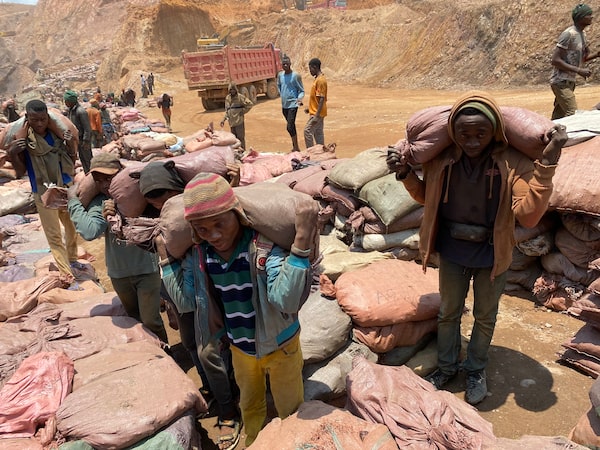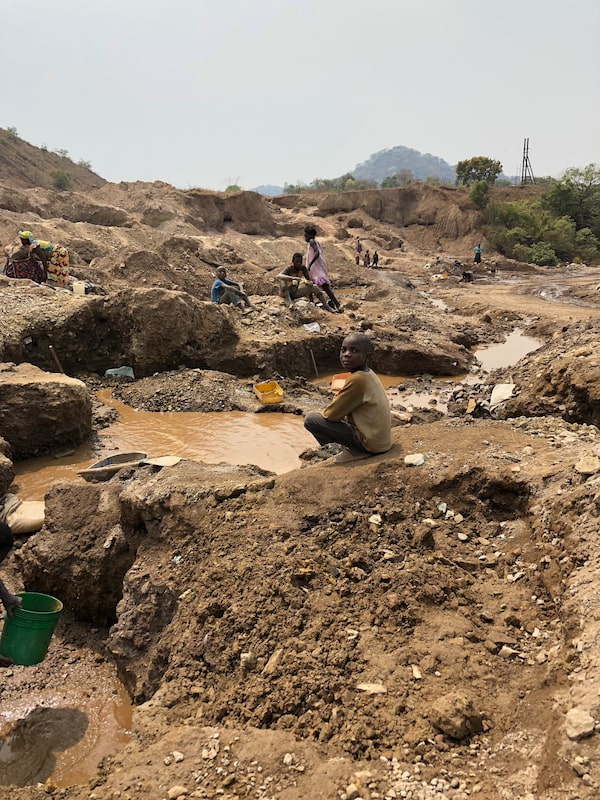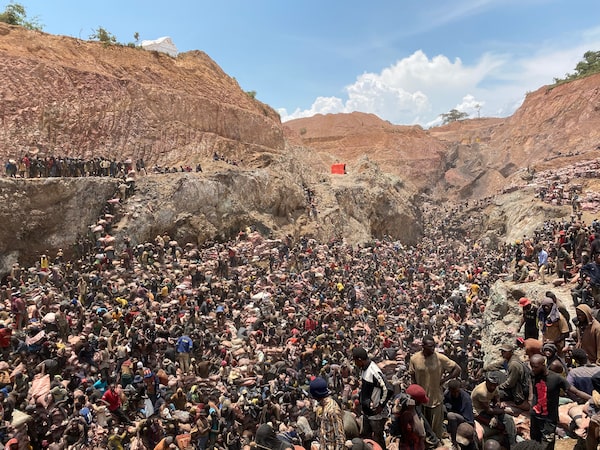
Artisanal miners struggle under the weight of 50 kg sacks of cobalt ore at the Shabara mine in the Democratic Republic of Congo.Siddharth Kara/The Globe and Mail
Siddharth Kara is associate professor of human trafficking and modern slavery at Nottingham University and the author of Cobalt Red: How the Blood of the Congo Powers Our Lives.
During one of my trips to the Congo, I met Jolie in her small home of cracked brick walls and rusted roofing in the cobalt-mining town of Kolwezi. Although Jolie had invited me to her home that day to discuss her story, the moment I arrived it felt as if she regretted my presence. She did not wish to speak at length.
To prevent Jolie and everyone else I’ve interviewed from being identified and targeted for reprisal, I have used pseudonyms for them and am withholding the dates on which we met. This is also to protect my continuing research, which delves into the often unseen, yet heavy cost that the Global South pays for the First World’s ideals and conveniences.
Tucked in the southeastern corner of the Democratic Republic of Congo, Kolwezi is home to several colossal open-pit copper-cobalt mines that have all but swallowed the city. Jolie’s home was in a frenetic locale with some of the densest mineral concentration. Thousands of residents dig tunnels by hand in a dangerous hunt for the critical component for batteries used in everything from cellphones to electric vehicles.
None of the tunnels have ventilation shafts, rock bolts or supports, and they often collapse.
Jolie’s husband, Crispin, and her teenage son, Prosper, worked there underground – two of the hundreds of thousands of women, men and children as young as 6 who spend their days across this region digging for cobalt. They are called “artisanal miners” in the industry, although this quaint term belies the miserable conditions under which they toil.
Using shovels, pickaxes and rebar, the artisanal miners scavenge for cobalt in highly hazardous conditions, suffering toxic contamination from cobalt dust and shattered bones from pit wall collapses. At the end of each gruelling day of work, most artisanal miners are only paid a dollar or two. Fear assailed Jolie every day that Crispin and Prosper went to work.
Cobalt is vital to rechargeable batteries because it allows them to hold maximum charge while retaining thermal stability. Without cobalt, we would all be plugging in our gadgets and cars more often, and eventually, those batteries might catch on fire. The DRC is responsible for almost 75 per cent of global cobalt production. And as much as 30 per cent of this production is mined by hand by people like Crispin and Prosper.
If you are reading this article on a smartphone, tablet or laptop, you likely join me in unwittingly contributing to a human-rights and environmental catastrophe in the DRC. Later, when you check your social-media account, send a few e-mails and perhaps drive home in an electric vehicle, you might unknowingly do so again and again.
As do governments like Canada’s when they, however well-intentioned, push toward net-zero carbon emissions without taking adequate steps to ensure basic standards of human rights and sustainability are maintained at the bottom of the supply chain.
In the coming years, demand for cobalt will increase dramatically, driven by the global transition to electric vehicles. According to a BloombergNEF report, there were approximately 26 million EVs on the road at the end of 2022, but in order to meet the net-zero climate sustainability pledges from the Paris Agreement, several hundred million EVs will need to replace gas-powered cars by 2050. And so, inevitably, the world will turn further to the Congo.
It is inconceivable that the First World would pursue a clean-energy transition with the blood of the Third, by causing immense violence against the people and environment of the Congo. Green for us cannot be red for them.
Nearly every major consumer-facing technology or electric-vehicle manufacturer makes public assurances that they adhere to international human-rights norms and require the same of their suppliers all the way down to the mining level in the DRC. They also claim that the mining companies in the Congo selling them their cobalt do not use artisanal miners.
But the greatest lesson I have learned through my journeys to the Congo is that there is perhaps no such thing as “clean cobalt” from the DRC.
All the cobalt excavated from Jolie’s neighbourhood in Kolwezi, to the tune of 50,000 tonnes a year, is sold through Chinese intermediaries to industrial mining companies, mixed into their production and sold up the formal supply chains. Artisanal miners also dig directly inside many industrial mines in the Congo.
As cobalt travels up the supply chain, passing from refiners to battery manufacturers, the commingling between artisanal and industrial production becomes impossible to unravel.
It does not matter from which specific company we purchase our rechargeable gadgets and cars. They all contain at least some cobalt mined by some of the poorest people in the world, scrounging in subhuman conditions akin to colonial slavery.
Journey through the Congo’s mining provinces of Haut-Katanga and Lualaba, and you’ll experience the destructive frenzy unleashed by the rechargeable economy. To make way for the mines in Kolwezi, tens of thousands of villagers have been displaced, countless trees have been clear-cut, and the surrounding air, earth and water have been contaminated with toxic effluents, causing untold harm to the artisanal miners.
At the opposite end of the mining provinces from Jolie’s home, in a town called Kipushi, I met a young woman named Priscille. She spent each day painstakingly sieving cobalt-bearing sand from mud. If she worked hard enough for 12 hours she could fill one sack, for which she was paid less than one dollar.
There were more than 3,000 artisanal miners in the area, including hundreds of children, hacking in pits and trenches across a vast wasteland. An oppressive haze of grit and toxic particulates hung above the landscape, and Priscille told me that her husband had died a year earlier of a respiratory ailment. She said they tried to have children, but she miscarried twice.

There are thousands of children who dig for cobalt in remote hills, such as these near Likasi.Siddharth Kara/The Globe and Mail
“I thank God for taking my babies,” she said. “Here it is better not to be born.”
Tragically, this is not the first time the Congo has been pillaged for resources vital to automobiles. In 1888, John Boyd Dunlop invented rubber tires, and the scramble for rubber was on. King Leopold II of Belgium had just secured the Congo region in 1885 as a personal colony, and it turned out that the Congo had one of the largest rubber tree forests in the world.
Leopold deployed a mercenary army that terrorized the native Congolese people to extract rubber in one of the most ruthless episodes of slavery in history.
Now, 130 years later, we are in the midst of a new automobile revolution – the transition from gas-powered cars to electric vehicles. The battery packs in most EVs require up to 10 kilograms of refined cobalt, suggesting that millions of tonnes of cobalt will be needed to meet future demand.
Immense demand-side forces will continue to push countless Congolese people into dangerous pits and tunnels to feed cobalt up the chain. And once again the people and resources of the Congo are being plundered. It is the latest chapter in a long history of torment in the heart of darkness.
There is little that consumers can do to alleviate the enormous suffering of the Congolese people, other than to demand that tech and EV companies accept responsibility for the people who mine their cobalt. Every one of these companies should have teams on the ground ensuring artisanal miners are paid proper wages, provided PPE and afforded dignified working conditions.
They should also strengthen artisanal mining communities by investing in schools, health clinics and sanitation. It seems a small price to pay for companies that rely so heavily on the labour and resources of the Congolese people – and their blood.
A few months before I met Jolie, Crispin and Prosper were working with a large group of men and teenage boys to excavate a tunnel complex in Kolwezi. The main shaft of the tunnel was about 30 metres deep, at which depth the diggers found a cobalt deposit. They excavated it along the vein of ore, spending up to 14 hours crouched in a narrow tunnel without room to sit up, inhaling toxic particulates in the suffocating heat.
It was not long before the inevitable happened. Dreaded news arrived at Jolie’s door, and she rushed to the site in a state of terror. “My life ended that day,” Jolie recalled. “Mimi ni mzimu.” I am a ghost.
The tunnel had collapsed, and every digger in the tunnel, including Crispin and Prosper, had been buried alive.
Now, the agonizing memories of that day are rekindled every time Jolie sets foot outside her home.
The tunnel is only 10 metres from where she lives, Jolie said. “I walk by that place every day. I look down at the ground. Crispin and Prosper are still there. They are under my feet.”

More than 15,000 artisanal miners dig inside the main pit at the Shabara industrial mine.Siddharth Kara/The Globe and Mail